胶球清洗系统介绍:德国达级公司
- 格式:ppt
- 大小:19.11 MB
- 文档页数:57
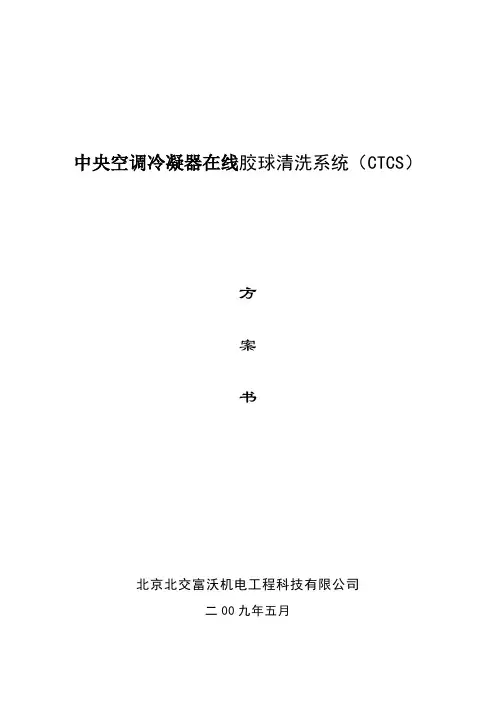
中央空调冷凝器在线胶球清洗系统(CTCS)方案书北京北交富沃机电工程科技有限公司二00九年五月公司简介北京北交富沃机电工程科技有限公司位于北京市海淀区,系北京市科学技术委员会认定的新型股份制高新技术企业。
公司专业从事以工业自动化为核心的节能环保、试验检测、施工作业类机械电子产品的开发、生产、销售和服务。
公司以科技为先导,重视技术创新。
密切跟踪国际上的技术发展,以专业的视角和长期的技术沉淀不断地推出更好的技术和产品,公司现有新技术、专利等十余项,致力于为用户提供最优质的服务。
“励志兴业,修德致远”公司注重与员工和谐发展,“以人为本,注重人才”凝聚了一批优秀的高技术人才。
公司员工全部有大专以上学历。
公司核心的研发队伍源自于北京交通大学,并与中国电科院、铁道科学研究院、交通部科学研究院等行业内科研院所进行广泛合作,形成了以公司内部力量为主导的开放式研发格局。
公司产品严格按照ISO9001国际质量认证体系生产,并广泛应用于中央空调、发电、交通、冶金、建筑等领域。
公司产品符合并优于国内同行业标准。
所有产品均通过合法授权的相关行业中心鉴定,质量可靠稳定。
我们从来不把和用户的关系定位成简单的贸易关系,在售前为用户提供详实、充分的咨询;向用户提供合乎规范的精良产品和工程施工;售后向用户提供更完备的技术服务和及时的零配件供应“服务到极致、服务再延伸”是我们不懈努力和追求的目标。
坚持秉承“创新、优质与不断改良”为企业文化的富沃科技工程公司,以“关注品质、精益求精”为经营宗旨,坚持“用户第一”的商业理念,使用户获得尽善尽美的服务及快速的送达。
我们的产品和服务将帮助您工作更加出色。
Help you make things better!前言中央空调是现代大厦物业、宾馆、商场不可缺少的设施,它能带给人们温馨舒适的每一天。
由于中央空调功率大、能耗大,加上设计上多数存在“小马拉大车”的现象,支付中央空调所用电费是用户一项巨大的开支。
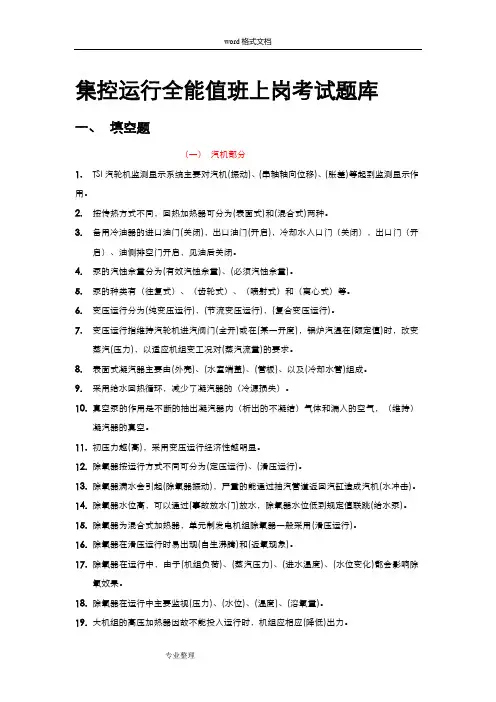
集控运行全能值班上岗考试题库一、填空题(一)汽机部分1.TSI汽轮机监测显示系统主要对汽机(振动)、(串轴轴向位移)、(胀差)等起到监测显示作用。
2.按传热方式不同,回热加热器可分为(表面式)和(混合式)两种。
3.备用冷油器的进口油门(关闭),出口油门(开启),冷却水入口门(关闭),出口门(开启)、油侧排空门开启,见油后关闭。
4.泵的汽蚀余量分为(有效汽蚀余量)、(必须汽蚀余量)。
5.泵的种类有(往复式)、(齿轮式)、(喷射式)和(离心式)等。
6.变压运行分为(纯变压运行),(节流变压运行),(复合变压运行)。
7.变压运行指维持汽轮机进汽阀门(全开)或在(某一开度),锅炉汽温在(额定值)时,改变蒸汽(压力),以适应机组变工况对(蒸汽流量)的要求。
8.表面式凝汽器主要由(外壳)、(水室端盖)、(管板)、以及(冷却水管)组成。
9.采用给水回热循环,减少了凝汽器的(冷源损失)。
10.真空泵的作用是不断的抽出凝汽器内(析出的不凝结)气体和漏入的空气,(维持)凝汽器的真空。
11.初压力越(高),采用变压运行经济性越明显。
12.除氧器按运行方式不同可分为(定压运行)、(滑压运行)。
13.除氧器满水会引起(除氧器振动),严重的能通过抽汽管道返回汽缸造成汽机(水冲击)。
14.除氧器水位高,可以通过(事故放水门)放水,除氧器水位低到规定值联跳(给水泵)。
15.除氧器为混合式加热器,单元制发电机组除氧器一般采用(滑压运行)。
16.除氧器在滑压运行时易出现(自生沸腾)和(返氧现象)。
17.除氧器在运行中,由于(机组负荷)、(蒸汽压力)、(进水温度)、(水位变化)都会影响除氧效果。
18.除氧器在运行中主要监视(压力)、(水位)、(温度)、(溶氧量)。
19.大机组的高压加热器因故不能投入运行时,机组应相应(降低)出力。
20.大型机组超速试验均在带(10%-15%)负荷运行(4-6)h后进行,以确保转子金属温度达到转子(脆性转变温度)以上。
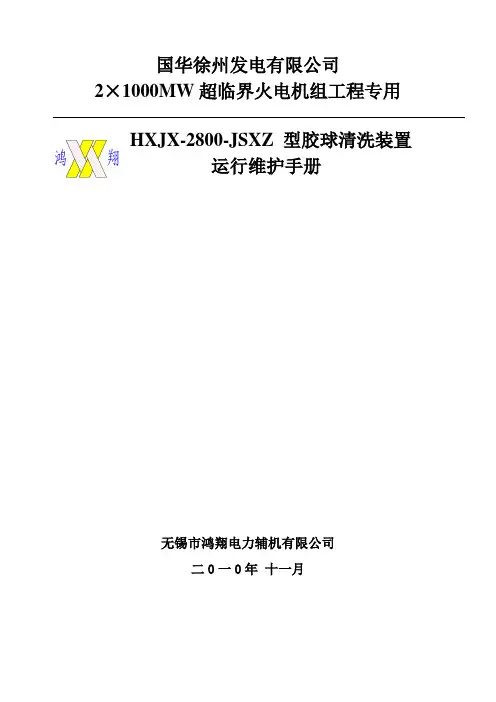
国华徐州发电有限公司2×1000MW超临界火电机组工程专用HXJX-2800-JSXZ 型胶球清洗装置运行维护手册无锡市鸿翔电力辅机有限公司二0一0年十一月目录一、胶球清洗和胶球清洗工作原理二、胶球清洗系统各设备的作用三、控制系统四、安装五、胶球装置操作运行六、提高收球率的注意事项一、胶球清洗系统和胶球清洗工作原理:1、胶球清洗系统:是由胶球泵、装球室、收球网、阀门及相应的管道所组成,在凝汽器左右两侧各配置1套单独的胶球清洗系统与之配套,以确保胶球清洗系统定期清洗,使凝汽器铜管内壁的泥垢和浮生物去除,长期保持清洁从而达到提高冷却管传热系数的目的。
见图:凝汽器胶球清洗系统图2、胶球清洗工作原理:先将比重与水相近(0.98-1.02)的胶球加进装球室后,启动胶球泵,胶球在比循环水压力略高一点的水流带动下进入凝汽器水室进口,随即同循环水混合并流向水室而进入铜管,由于胶球输送管出口朝下,故球分散均匀进入凝汽器铜管。
胶球虽比铜管内径大1-2mm,然而它是多孔、柔软的弹性体,故仍可在较小的压差作用下,形变而进入凝汽器铜管,在铜管中的胶球形状成卵形,并与铜管内壁有一整圆接触,这样胶球在进行过程中等于把铜管内壁擦抹一遍,当胶球流入凝汽器出水管口时,它在本身弹力的作用下,突然恢复原状,这就消除了胶球表面的污垢(若胶球表面还有些污泥将在运动中消除)并随水流向出水管,而至收球网,在网壁的拦阻及出水的冲动下,球进入网底,由于胶球泵进水管接在此处,故胶球在进口负压的作用下吸入胶球泵,再重新进入装球室重复以上运动。
随机组的大小,胶球管道的长短及循环水流速,胶球在系统中循环一周的时间约在10-30秒。
二、胶球清洗系统各设备的作用:1、胶球清洗泵由于胶球本身无能量,若要使它能从出水管里的收球网中重新进入凝汽器的进水管,没有动力是不可能的,要获得比循环水进口压力略小的压力,必须配有胶球输送装置—胶球泵。
胶球清洗泵的选型随机组容量和胶球系统要求决定。
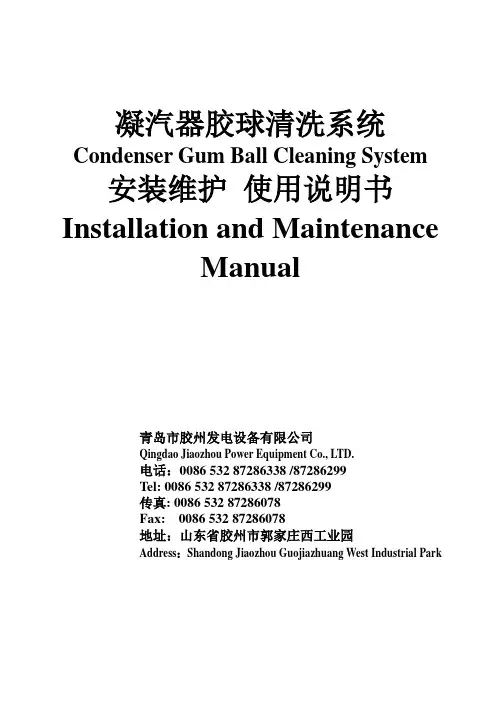
凝汽器胶球清洗系统Condenser Gum Ball Cleaning System 安装维护使用说明书Installation and MaintenanceManual青岛市胶州发电设备有限公司Qingdao Jiaozhou Power Equipment Co., LTD.电话:0086 532 87286338 /87286299Tel: 0086 532 87286338 /87286299传真: 0086 532 87286078Fax: 0086 532 87286078地址:山东省胶州市郭家庄西工业园Address:Shandong Jiaozhou Guojiazhuang West Industrial Park目录CONTENT第一章胶球清洗系统布置和安装ChapterⅠLayout and Installation of Gum Ball Cleaning System 第二章设备安装Chapter II Equipment Installation第三章胶球清洗系统运行Chapter III Running of Gum Ball Cleaning System第四章停用保养Chapter IV Disable Maintenance第五章管理Chapter V Management第六章检修、检查、维护Chapter VI Overhaul, Inspection and Maintenance第七章故障及处理Chapter VII Failure and Solution第一章胶球清洗系统布置和安装ChapterⅠLayout and Installation of Gum Ball Cleaning System一、胶球清洗系统布置方式有两种Ⅰ. There are two layout ways of gum ball cleaning system1、单元制系统Modular system1、排污口2、清洗蝶阀3、二次滤网4、装球室5、球阀6、胶球泵7、收球网8、收球网板操作机构.1. Outfall 2, Cleaning valve 3, Secondary screen 4, Ball room 5, Ball valve 6, Gum ball pump 7, Ball screen 8, Ball net plate operating mechanism.2. Sharing system2、共用制系统Common control system1、排污口2、清洗蝶阀3、二次滤网4、电动机5、收球网6、装球室7、球阀8、胶球泵9、分汇器.1. Outfall 2, Cleaning valve 3, Secondary screen 4, Motor 5, Ball screen 6, Ball room 7, Ball value 8,Gum ball pump 9, Sub-exchange device.胶球清洗系统安装应遵照供货单位提供的系统布置图和技术要求进行安装,不可随意增减系统中的相对位置.The installation of gum ball cleaning system shall be subject to system layout diagram and technical requirements provided by supply unit, prohibit increase or decrease the relative position of the system arbitrarily.二、不同布置方式的适用范围:II. The scope of application of different layout:a、单元制系统,适合于为100MW以上容量的机组配套使用.优点是对凝汽器各侧可同时进行清洗;另外,任何一侧的胶球清洗系统出现故障,均不会影响另一侧的正常运行.b、共用制系统,适合于小机组使用.优点是设备少,主要缺点是当系统中共用部分发生故障时,凝汽器的任何一侧都无法清洗.a. Modular system is suitable with the units of over 100MW. Advantage is that each side of condenser can be cleaned at the same time; Moreover, any side of the gum ball cleaning system broke down, which will not affect the normal operation of the other side.b. Sharing system is suitable for use in small units. Advantage is less equipment, and the main drawback is that when the common parts of the system broke down, any side of the condenser can not be cleaned.第二章设备安装Chapter II Equipment Installation收球网:Ball screen:收球网尽量采用立式安装,并且收球网胶球引出管尽量高于胶球泵入口.收球网在循环水管弯头后很近处安装时,应使操作轴与弯头方向相平行;对SD型收球网最好采用操作轴与弯头方向相垂直的布置方式,且在收球位置时,网板进口端靠在内侧筒壁.收球网若采用卧式布置时,胶球引出管应按要求在收球网底面或侧面.Ball screen adopts vertical installation as far as possible, and ball screen gum ball extraction tube shall be higher than gum ball pump.When installing the ball screen closed to circulating water pipe elbow, they should make the operation shaft run parallel to the direction of elbow; about SD-type ball screen, preferable to use the layout of operation axis perpendicular to the direction elbow, and in the position received the ball, head of the halftone leaning against the inner tube wall. If the ball screen adopts horizontal layout, the gum ball extraction tube should bet at the bottom or the side of the ball screen as required.胶球泵:Gum ball pump:胶球泵安装的相对位置不宜过高,以防气蚀.胶球泵的吸上真空高度一般为7m水柱.The relative position of gum ball pump should be not too high to prevent gas etching. The vacuum suction height of gum ball pump is generally the water column of 7m.装球室:Ball room:用于贮存、更换胶球及观察胶球运动,故安装位置应便于操作人员接近,放气、放水管接至排水地沟.For use of storage, replace of gum ball and the observation of gum ball’s movement, so the installation location should be accessible to the operator, exhaust tube and offlet connected to the drainage trench.胶球管路及阀门:Gum ball piping and valves:胶球管路应短直流畅,球阀或蝶阀安装位置应便于操作,装球室进口阀在装球室的进口处安装,管系严密不漏.Gum ball piping should be short, straight and smooth. The installation location of ball valve or butterfly valve should be easy to operate. Suction valve shall be installed on the entrance of ball valve. Piping shall be tight and no leaking.循环水系统中安装有二次滤网时,一般情况下,二次滤网出口至凝汽器间,循环水的长度有限,但布置投球管时,应遵照以下原则,且不可在凝汽器水室中布置.When installing the secondary screen in circulating water system, generally, the circulating water is limited in length from the outlet of the secondary screen to the condenser, but arranging pitch pipes shall be subject to the following principles, and can not do in water room of the condenser.循环水管通径DN<1200时,投球管(伸入循环水管中的胶球管路)用一根,并伸至循环水管中心,DN≥1200mm时,用两根并在循环水管同一正截面内对称布置,两管口中心在循环管同一直径上,管口间距离等于循环水管半径,投球管出口逆循环水流方向.When the circulating water pipe diameter DN <1200, the pitch pipe (the gum ball piping stretching into the circulating water pipe) adopts one, and extended to the center of circulating water pipe. When DN ≥ 1200mm, use two to parallel in the same section of the circulating water pipe with symmetrical arrangement, centers of the two nozzles in the same diameter of the loop pipe, the distance between the nozzle is equal to the radius of the circulating water pipe, and the outlet of the pitch pipe opposes circulating flow direction.控制装置:Control device:控制柜或程控柜,应在通风、干燥、且靠近装球室处安装.Control cabinets or program-controlled cabinets should be installed in ventilated, dry, and close to the ball room.二次滤网:Secondary screen:配装有二次滤网的胶球清洗系统中,二次滤网的安装部位,一般情况下应离开凝汽器进口一段距离,这样对于投球管的布置有利.以海水为冷却水源的电厂,二次滤网宜靠近凝汽器进口布置,以便减少二次滤网后循环水管中海生物的数量,从而减少冷却管、收球网被堵塞的机会.二次滤网的排污管路应短直流畅,尽量减少管路水阻,因为二次滤网排污是依靠循环水压差来实现的,故排污水阻大时会直接影响排污效果.In the gum ball cleaning system with the secondary screen, the installation position of the secondary screen should keep a distance from the entrance of the condenser, so that it’s favorable for the arrangement of pitch pipe. Regard the seawater as the cooling water plant, the secondary screen should be close to the entrance of the condenser in order to reduce the number of sea creatures in the circulating water pipe after the secondary screen, thereby reducing the opportunities of the blocked cooling pipe and ball screen. The blow-off line of the secondary screen should be short, straight and smooth, minimize the water resistance of piping, as the secondary screen scavenging relies on recycled water pressure to achieve, the large sewage water resistance will affect effects of sewage directly.胶球清洗系统的安装,应按照制造厂提供的系统布置图和技术要求进行,不可随意增减系统中配套件的数量和改变设备配套件的数量和改变设备配套件在原系统中相对位置.The installation of gum ball cleaning system should be in accordance with layout diagram and technical requirements provided by factory, prohibit increase or decrease the number of component parts and the relative position of the system arbitrarily.第三章胶球清洗系统运行Chapter III Running of Gum Ball Cleaning System运行必备条件:Running prerequisites:1、凝汽器:Condenser:a、水室中的涡流区、水室中隔板窜通缝隙及窄缝(由于水室四壁、水室隔板与端盖同密封垫尺寸不合适所致,将会引起积球)应于消除;水室中除循环水管外其余通往外部的管道,应在管口加装孔径小于Φ7mm的球面网罩;水室中垢片、锈片及杂物通水前清理干净.The water in the room, water vortex zone partition channeling through cracks and narrow gap (due to water chamber walls, and cover with gasket partition size doesn't fit, will cause the ball) should eliminate product;Water in the room except the circulating water pipes to the rest of the pipeline, should be in the outer tube diameter less t han Φ 7mm installs the spherical nets mask; clean the dirty things ,rust and sundries in the room, before working with the water.b、冷却管每种规格的管径均匀一致,管内无阻碍胶球通过的杂物;胶球清洗系统初始投运时,冷却管内壁应洁净无垢,已结硬垢的应采取措施彻底除垢;管板若涂刷环氧树脂等涂料,应严防因此缩小冷却管口通径;胀管时,管口伸出管板长度不宜超过2.5mm.Cooling tube diameter of each specification uniform, tube unimpeded by sundry ball;when the Rubber ball cleaning systems works first, cooling tube initial operation wall should be clean, has hardened scale measures should be taken to complete removal;If a tube plate coating epoxy coating should be protected, thus narrowing cooling pipe size;When the pipe expanding, tube sheet length is out over 2.5 mm.2.循环水及循环水管:Water and circulating water pipes:a、循环水量宜保持在设计值的±15%范围内.亦可根据以后的清洗效果适当改变对循环水量的控制范围.In the design of water cycle in the range of ± 15% value. Also we can change the control of the water cycle according to the appropriate after cleaning effect.b、一次滤网(包括拦污栅、扒草机等)完好.工作正常,能保持无大于收球网栅格间距的杂物通过,否则必须配装二次滤网.Once filter screen(including Trash rack, grilled grass machine etc)is complete Ok, in proper working order, It can keep the charge of the no more grid spacing sundry through, otherwise we must Equipped with secondary filter.c、循环水需充满凝汽器水室,若充不满则必须采用比重大于循环水的湿态胶球(胶球吸足水后的状态).Circulating water should be full of the room of the condenser, if it can’t be full of ,we must use proportion than circulating wet glue ball (rubber ball absorb enough water after the state).d、循环水管中的垢片、锈片和杂物通水前清理干净.Clean the dirty things ,rust and sundries in the cycle water pipe before working with the water. 3、胶球:Rubber ball:耐磨、质地柔软、富于弹性、气孔均匀贯通、硬度适中、湿态比重1.00-1.15、在5-45℃水温下及使用期内环境胀大不超标、不老化.Hard wearing, soft,elastic,porosity evenly, hardness moderate, Wet proportion in the 5-115, 100-45 degrees Celsius temperature and use period swell not overweight, environment of aging.4、设备:Equipment:胶球清洗装置及配套件,安装符合要求,具备正常使用条件.Rubber ball cleaning equipment and accessories, installation requirements, with normal conditions of use.5、运行注意事项:Running note:胶球清洗系统安装后,应及时进行调试;调试合格后,按规程要求经常操作运行.After install the rubber ball cleaning system, it should be debugged on time; after debugging it successfully, make it work according to the directive rules.6、胶球规格:Rubber ball specifications:开始使用的胶球湿态直径比冷却管中较小一种规格的内径大1.0-2.0mm,使用中球径磨损到等于或小于上述冷却管内径时及时更换;采用金刚砂球清除冷却管硬垢时,其湿态球径比上述冷却管内径小1.0-2.0mm,待硬垢基本除净后应停用.球径及硬度还与循环水量有关.Start using the wet cooling tube diameter bigger than cooling tube small a specification as 1.0-2.0 mm diameter, during the working, when it wears to equal to or less than the cooling tube diameter, it should be changed; when use emery ball to get rid of the hard scale of the cooling tube,the wet ball diameter less than the cooling tube diameter of 1.0-2.0 mm, after finishing get rid of it, it should be stopped to be used. The sphere diameter and the hardness are also relevant with the water cycle.7、正常投球量:The normal work:投入运行的胶球数量为凝汽器单侧单流程冷却管根数的7%-13%,取下限或靠近下限的数量,胶球循环一次不超过30秒.The rubber ball into operation for single flow condenser cooling tube unilateral number of 7-13% lower limit, or close to the quantity, rubber ball cycle time does not exceed 30 seconds.8、清洗周期和清洗时间:The cleaning cycle and cleaning time:胶球清洗系统每天运行(清洗)一次,每次30分.用户也可根据以后的清洗效果适当改变上述数值.Rubber ball cleaning system operation (cleaning) once every day, each time 30 minutes. The user may change the value according to the cleaning effect.9、胶球补充周期和更换周期:Rubber ball added cycle and change cycle:胶球清洗系统累计运行七次,补充胶球;累计运行60次,进行更换.用户还可根据各自具体情况如投球数量、实际收球率(满足投运条件、系统正常运行30分、收回的胶球数与投入运行的胶球数的百分比),所用胶球的耐磨性能等,适当调整上述周期.个别胶球可能在水中浸泡一段时间后,胀大过多,球径超标,在检查补充和更换胶球时,均需随时换掉.After the rubber cleaning system runs for seven times, replenish the rubber ball; after it runs 60 times, change it. The user also can according to the specific passion of their own to move the times above, such as pitching quantity、actual charge ball rate(Meet operation conditions、Normal operation system 30 points、The percent of the rubber ball back and operation of the rubber ball)、the Wear-resisting performance of the rubber ball, etc. Several rubber balls maybe swollen a lot after soaking in the water for a period of time, the ball diameter out of limits. When we check or mend or change the rubber balls, they should be changed.安装有循环水二次过滤系统.两个系统不得同时运行;必须在循环水二次过滤系统运行结束之后,胶球清洗系统才允许投入运行.Install a water second filtration system. The two system can’t be run at the same time; it must be u sed after the water second filtration system finish it’s running.二次滤网的网芯网孔为7mm,所有大于7mm的污物杂质,保证不会进入凝汽器水室内,从二次滤网排污管道内排出.The nets core and the net hole of the secondary filter are 7mm,all the dirt impurities are bigger than 7mm, can’t be entered to the cond enser room, they will row out of the sewage pipe of the secondary filter.二次滤网排污是通过网芯前后压差值由差压变送器来实现自动排污,差压变送器动作值设置在P(二次滤网开始运行时测得压力值+0.2MPa),当网芯前后压差值≥P时,差压变送器开始传送排污信号,来实现排污。

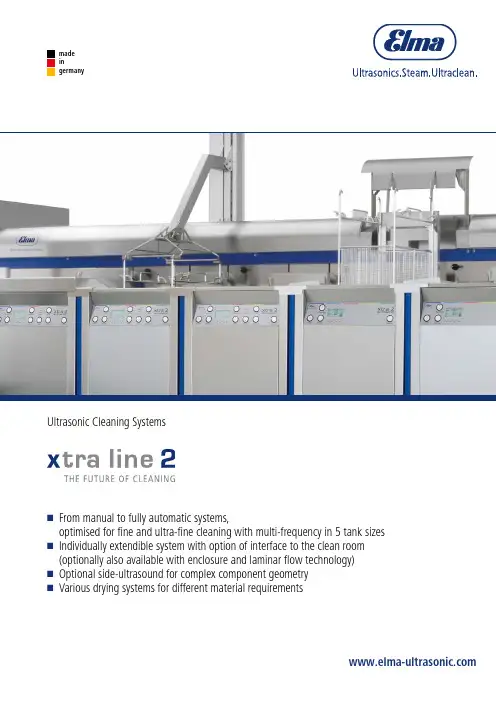
made ingermanyQ From manual to fully automatic systems,optimised for fine and ultra-fine cleaning with multi-frequency in 5 tank sizes Q Individually extendible system with option of interface to the clean room (optionally also available with enclosure and laminar flow technology) Q Optional side-ultrasound for complex component geometry Q Various drying systems for different material requirementsUltrasonic Cleaning SystemsTechnical dataUltrasonic Cleaning Re-definedAdvantages and benefitsQ Modular system set-up with 5 tank sizesQ Multi-frequency technology with 25/45 kHz or 37/130 kHzQ For fine and ultra-fine cleaningwith rounded tank corners and special pipeworkQ Optional side-ultrasound technology for special component geometryQ Different drying systems (hot-air, infra-red and vacuum drying) for different material requirementsQ Compact system design with easy-to-clean surfaces Q Integrated ancillaries such as filters, oil separators, etc. Q IPC control with intuitive operating concept Q Equipped with floor tank as standardQ Extremely service and maintenance friendly thanks to the compact system design with easily accessible andswiftly replaceable componentsx tra line 2 is at home in the following industries.The right cleaning system for the task at handDesigned for fine and ultra-fine cleaning tasks, the x tra line 2 can be flexibly deployed and extended due to the modular sys-tem concept (building block system) at any time. Different tank sizes can even be easily accommodated in one system, so that individualised systems are conceptualised.The compact, closed system design enables easy system maintenance. Ancillaries for bath care, such as oil separators, filter units or similar, are positioned inside the system in order to save space. Removable back elements facilitate the easy maintenance and servicing of the x tra line 2. All of the pipework can therefore also be easily accessed.With the new transport robot, the conversion speed is increased by up to 20 %. Furthermore, the following baskets and carriers can be used with the transport robot: Q Normal baskets in transport mode, Q Horizontal turning devices for bulk materials baskets, Q Vertical rotation devices for fixed parts, such as optical lenses, as well asQ Lift rotation devices for positioned components in carriers.Q Production of medical technology and precision optics, Q In the aerospace industry, Q Pharmaceutical industry, Q Manufacture of watches and jewellery, Q Electronics and metalworking industry, and much more.Service, ancillaries and accessories for x tra line 2 systems Individually aligned to your requirementsDifferent parts can be cleaned using the different basket types. Whether it is bulk materials or individually positioned parts, baskets/carriers with different mesh sizes or with coated contact surfaces, the transport of parts is individually tailored to customer requirements and the cleaning process.With bath care, filtration and disposal ancillaries of the x tra line 2, the contamination is easily collected and separated. For example oil, in concentrated form, is collected and can be disposed of in an environmentally-friendly way.Not only is this good for the environment, but it also saves money.Our modular system (building block principle) allows the integration of many of the ancillaries at the rear of the system. Due to the fact that these components can be easily inserted and replaced - through modular, exchange technology - maintenance and servicing periods are reduced to a minimum. Thereby, the system is back in action again very quickly.Another advantage of the x tra line 2 is the small amount of space required by these systems. Due to the integration of individual ancillaries such as oil sepa-rators, filters, etc., the systems require up to 30 % less space and have a neat, structured and easy-to-maintain appearance.So each x tra line 2 cleaning system can be easily integrated into existing production processes.Baskets and carriersThe x tra line 2 offers a comprehensive range of accessories precisely chosen to meet individual customer requirements. Automatic filling/emptying of the tanks, metering systems with automatic filling level control as well as measurement and status monitoring of the media used contribute to ensuring that the optimised cleaning processes remain safe and stable. This provides consistent and reproducible cleaning results for validation purposes.System ancillaries for bath care, filtration and disposalService and maintenance friendly designWith an x tra line 2 cleaning system, the first steps into professional precision cleaning are easy. For smaller quantities, a manual sys-tem, EASY x tra line 2, is the most suitable. If the system capacity is too small, it can be extended at any time thanks to the modular design, or supplemented by various ancillaries.Q In case of low throughputQ Easily extendible process, at any timeQ Throughput-optimised with transport robots and conveyor belts Q Process-safe, as IPC controlledQ Consistently high cleaning qualityQ With enclosureQ in order to meet highest cleaning requirements, Q for noise reduction and Q as interface to clean roomQ Enhanced by semi-automatic handling system for the movement of heavy partsQ User-friendly and ergonomically optimised operationx tra line 2The modular system that adapts to requirementsThus it is quite easy to adapt - even afterwards - to changing conditions and increasing requirements in terms of parts cleaning. Different transport systems such as the pneumatic handling system or the automatic transport system for heavy parts provide high throughput with the required level of process safety.Elma Schmidbauer GmbH · Gottlieb-Daimler-Straße 17 · D-78224 Singen (Germany) · Tel. +49 7731 882-0 · Fax +49 7731 882-266 · The Elma process laboratoryPerfect cleaning results are the measure of all things. In order to achieve these, the focus lies on designing the right sequence of individual process steps.This is where the Elma service concept comes in. Together with our customers, we individually develop a tailor-made cleaning process in the Elma process laboratory. Equipped with state-of-the-art technology, our laboratory carries out cleaning tests for customers on a daily basis and checks these results for the re-quired cleanliness level.Take advantage of our many years of experience and knowledge, and let us design your process solution!S u b j e c t t o t e c h n i c a l a n d o p t i c a l c h a n g e s . · x t r a l i n e 2_E N _11_17Tailor-cut Elma ServiceThe all-round carefree package for your cleaning systemThe Elma Service ConceptFrom process development through to system qualification, commissioning and assembly on site - for our customers we are a reliable and experienced partner for cleaning technology at their side. The worldwide network of Elma sales and service partners ensures that the supply of replacement parts, repair works and maintenance are carried out quickly and efficiently. The re-qualification of your system is also possible at any time. Our customers‘ systems are therefore always swiftly available for operation, contributing to theirsuccess.。
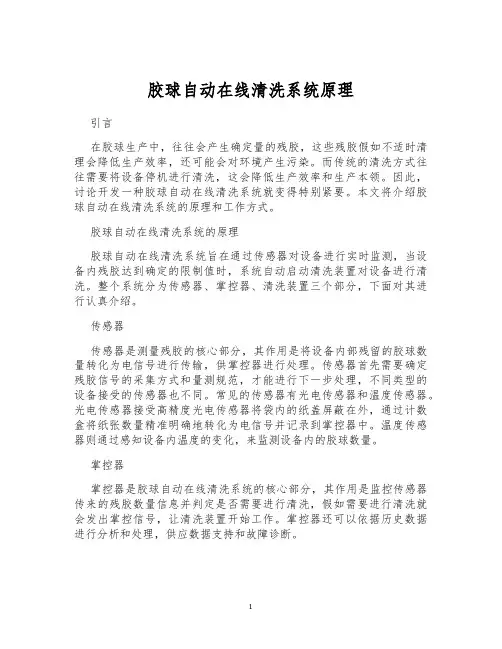
胶球自动在线清洗系统原理引言在胶球生产中,往往会产生确定量的残胶,这些残胶假如不适时清理会降低生产效率,还可能会对环境产生污染。
而传统的清洗方式往往需要将设备停机进行清洗,这会降低生产效率和生产本领。
因此,讨论开发一种胶球自动在线清洗系统就变得特别紧要。
本文将介绍胶球自动在线清洗系统的原理和工作方式。
胶球自动在线清洗系统的原理胶球自动在线清洗系统旨在通过传感器对设备进行实时监测,当设备内残胶达到确定的限制值时,系统自动启动清洗装置对设备进行清洗。
整个系统分为传感器、掌控器、清洗装置三个部分,下面对其进行认真介绍。
传感器传感器是测量残胶的核心部分,其作用是将设备内部残留的胶球数量转化为电信号进行传输,供掌控器进行处理。
传感器首先需要确定残胶信号的采集方式和量测规范,才能进行下一步处理,不同类型的设备接受的传感器也不同。
常见的传感器有光电传感器和温度传感器。
光电传感器接受高精度光电传感器将袋内的纸盖屏蔽在外,通过计数盒将纸张数量精准明确地转化为电信号并记录到掌控器中。
温度传感器则通过感知设备内温度的变化,来监测设备内的胶球数量。
掌控器掌控器是胶球自动在线清洗系统的核心部分,其作用是监控传感器传来的残胶数量信息并判定是否需要进行清洗,假如需要进行清洗就会发出掌控信号,让清洗装置开始工作。
掌控器还可以依据历史数据进行分析和处理,供应数据支持和故障诊断。
清洗装置清洗装置是实现在线清洗的关键部分,其作用是将设备内的残胶清理干净。
不同的设备和清洗需求,需要不同类型的清洗装置。
常见的清洗装置有喷水清洗装置、吸水清洗装置和喷气清洗装置。
喷水清洗装置通过在设备内部喷水进行清洗,将残胶冲刷干净。
吸水清洗装置则可以将设备内部的残胶吸取并进行处理。
喷气清洗装置则通过喷出高速气流将残留在设备内的物质清理掉。
胶球自动在线清洗系统的工作方式胶球自动在线清洗系统的工作方式基于传感器对设备残胶状态的实时监测,当设备内残胶达到确定的限制值时,系统自动启动清洗装置对设备进行清洗。
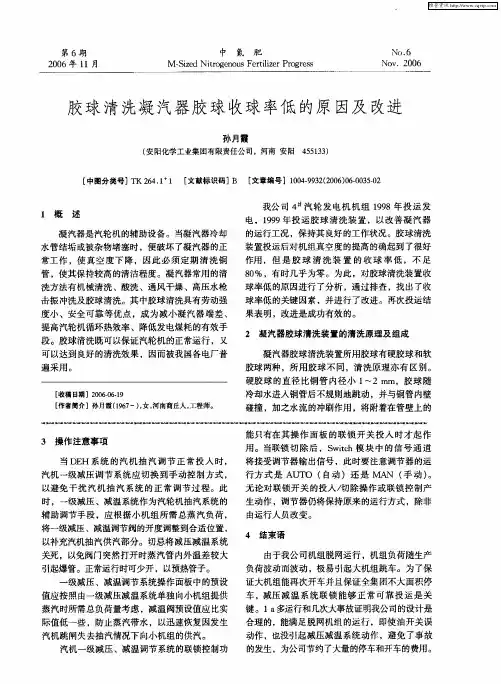
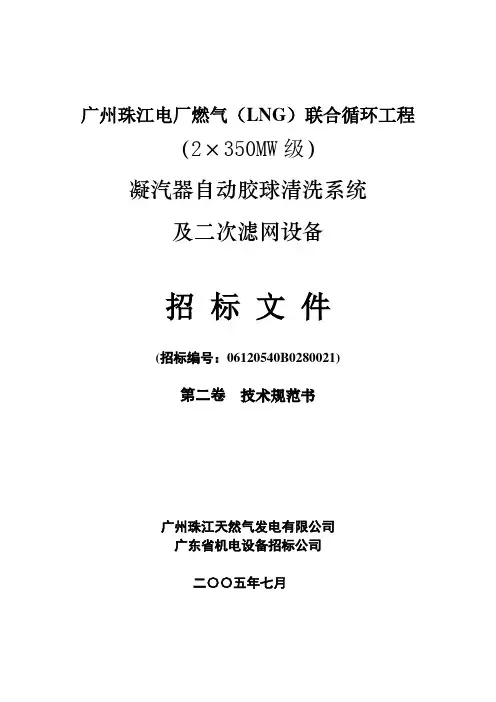
广州珠江电厂燃气(LNG)联合循环工程(2×350MW级)凝汽器自动胶球清洗系统及二次滤网设备招标文件(招标编号:06120540B0280021)第二卷技术规范书广州珠江天然气发电有限公司广东省机电设备招标公司二〇〇五年七月广州珠江电厂燃气(LNG)联合循环工程凝汽器自动胶球清洗系统及二次滤网技术规范书目录第一章技术规范 (2)第二章供货范围 (18)第三章技术资料和交付进度 (21)第四章监造、检验和性能验收试验 (25)第五章技术服务和联络 (29)第六章大(部)件情况 (32)第七章差异表 (33)附表—广州珠江电厂循环冷却水全分析 (34)附表—广州珠江电厂循环冷却水全分析...... 错误!未定义书签。
第一章技术规范1 总则1.1本招标文件适用于广州珠江电厂燃气(LNG)联合循环机组(2×350MW级)的自动胶球清洗系统及二次滤网,它提出了该设备的功能设计、结构、性能、安装和试验等方面的技术要求。
1.2 本技术规范书提出的是最低限度的技术要求,并未对一切技术要求作出详细规定,也未充分引述有关标准及技术协议的条文。
卖方保证提供符合技术规范书和相关的国际、国内工业标准的优质产品。
对国家有关安全、环保等强制性标准,必须满足其要求。
1.3 如未对本技术规范书提出偏差,将认为卖方提供的设备符合本技术规范书和标准的要求。
偏差(无论多少)都必须清楚地表示在本技术规范书第七章“差异表”中。
1.4 所提供的设备必须提供三维模型电子文档(dgn格式或dwg格式)。
1.5 卖方须执行本技术规范书所列标准。
有矛盾时,按较高标准执行。
1.6 本技术规范书对投标人首要条件是其产品应在相同容量工程或相似条件下有8台以上运行业绩,并超过三年、已证明安全可靠,且胶球清洗系统的收球率在95%以上,或能提供引进成熟技术进行合作生产的产品。
投标人所提供的业绩应包括项目名称、项目地址、项目容量、数量、联系人、联系电话等。
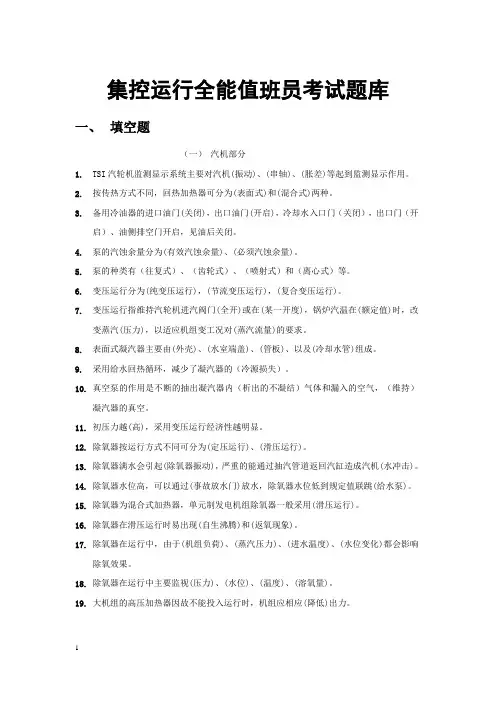
集控运行全能值班员考试题库一、填空题(一)汽机部分1.TSI汽轮机监测显示系统主要对汽机(振动)、(串轴)、(胀差)等起到监测显示作用。
2.按传热方式不同,回热加热器可分为(表面式)和(混合式)两种。
3.备用冷油器的进口油门(关闭),出口油门(开启),冷却水入口门(关闭),出口门(开启)、油侧排空门开启,见油后关闭。
4.泵的汽蚀余量分为(有效汽蚀余量)、(必须汽蚀余量)。
5.泵的种类有(往复式)、(齿轮式)、(喷射式)和(离心式)等。
6.变压运行分为(纯变压运行),(节流变压运行),(复合变压运行)。
7.变压运行指维持汽轮机进汽阀门(全开)或在(某一开度),锅炉汽温在(额定值)时,改变蒸汽(压力),以适应机组变工况对(蒸汽流量)的要求。
8.表面式凝汽器主要由(外壳)、(水室端盖)、(管板)、以及(冷却水管)组成。
9.采用给水回热循环,减少了凝汽器的(冷源损失)。
10.真空泵的作用是不断的抽出凝汽器内(析出的不凝结)气体和漏入的空气,(维持)凝汽器的真空。
11.初压力越(高),采用变压运行经济性越明显。
12.除氧器按运行方式不同可分为(定压运行)、(滑压运行)。
13.除氧器满水会引起(除氧器振动),严重的能通过抽汽管道返回汽缸造成汽机(水冲击)。
14.除氧器水位高,可以通过(事故放水门)放水,除氧器水位低到规定值联跳(给水泵)。
15.除氧器为混合式加热器,单元制发电机组除氧器一般采用(滑压运行)。
16.除氧器在滑压运行时易出现(自生沸腾)和(返氧现象)。
17.除氧器在运行中,由于(机组负荷)、(蒸汽压力)、(进水温度)、(水位变化)都会影响除氧效果。
18.除氧器在运行中主要监视(压力)、(水位)、(温度)、(溶氧量)。
19.大机组的高压加热器因故不能投入运行时,机组应相应(降低)出力。
20.大型机组超速试验均在带(10%-15%)负荷运行(4-6)h后进行,以确保转子金属温度达到转子(脆性转变温度)以上。
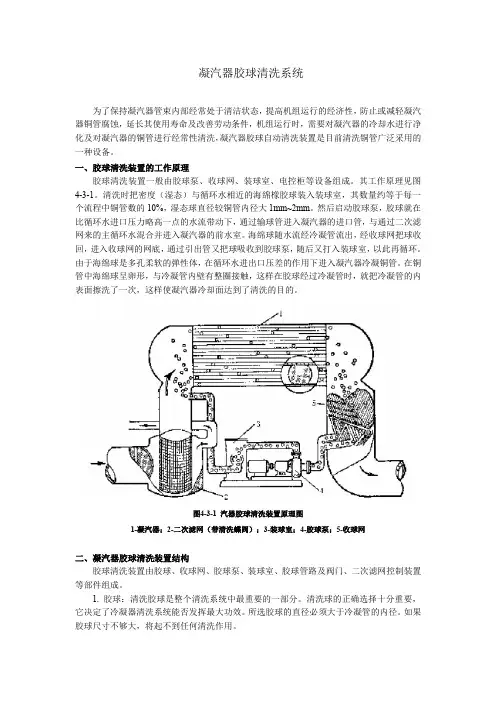
凝汽器胶球清洗系统为了保持凝汽器管束内部经常处于清洁状态,提高机组运行的经济性,防止或减轻凝汽器铜管腐蚀,延长其使用寿命及改善劳动条件,机组运行时,需要对凝汽器的冷却水进行净化及对凝汽器的铜管进行经常性清洗,凝汽器胶球自动清洗装置是目前清洗铜管广泛采用的一种设备。
一、胶球清洗装置的工作原理胶球清洗装置一般由胶球泵、收球网、装球室、电控柜等设备组成。
其工作原理见图4-3-1。
清洗时把密度(湿态)与循环水相近的海绵橡胶球装入装球室,其数量约等于每一个流程中铜管数的10%,湿态球直径较铜管内径大1mm~2mm。
然后启动胶球泵,胶球就在比循环水进口压力略高一点的水流带动下,通过输球管进入凝汽器的进口管,与通过二次滤网来的主循环水混合并进入凝汽器的前水室。
海绵球随水流经冷凝管流出,经收球网把球收回,进入收球网的网底,通过引出管又把球吸收到胶球泵,随后又打入装球室,以此再循环。
由于海绵球是多孔柔软的弹性体,在循环水进出口压差的作用下进入凝汽器冷凝铜管。
在铜管中海绵球呈卵形,与冷凝管内壁有整圈接触,这样在胶球经过冷凝管时,就把冷凝管的内表面擦洗了一次,这样使凝汽器冷却面达到了清洗的目的。
图4-3-1 汽器胶球清洗装置原理图1-凝汽器;2-二次滤网(带清洗蝶阀);3-装球室;4-胶球泵;5-收球网二、凝汽器胶球清洗装置结构胶球清洗装置由胶球、收球网、胶球泵、装球室、胶球管路及阀门、二次滤网控制装置等部件组成。
1. 胶球:清洗胶球是整个清洗系统中最重要的一部分。
清洗球的正确选择十分重要,它决定了冷凝器清洗系统能否发挥最大功效。
所选胶球的直径必须大于冷凝管的内径。
如果胶球尺寸不够大,将起不到任何清洗作用。
2. 收球装置:收球装置安装于凝汽器的冷却水出水管中,其功能是将胶球从冷却水中分离、完成收球器自动反洗和保证系统正常运行。
收球器主要部件有收球网、导流板、收球器、驱动机构等。
当收球网处于胶球循环位置时,收球网覆盖整个管道横截面,用于隔离胶球和冷却水,当收球网处于反洗位置时,冷却水从后面反洗收球网,将收球网的杂质冲洗干净。
5号机胶球系统改造方案一、现状我厂6号机胶球系统自1997年安装至今,一直无法投入运行,现有胶球系统所属设备无法满足运行需要;因循环水水质原因造成凝汽器铜管内表面经常结有软垢,虽经大小修进行单管清扫,但效果不佳,全年凝汽器端差指标低于计划值,机组经济性差。
二、改造方案及可行性1、内容:1)更换现设计不合理的胶球清洗系统和落后的设备;2)在凝汽器入口处循环水管加装二次滤网。
2、可行性凝汽器胶球清洗装置主要有:收球网、装球室、胶球泵、控制系统等组成。
1)收球网是胶球清洗装置中的主要设备之一,它安装在凝汽器出口循环水管道上(一般大多为立式安装)。
其作用是阻挡已通过凝汽器冷却管又分散在循环水中的胶球不随循环水一起被排掉,并汇集起来。
被胶球泵吸出供再循环使用。
SF型收球网简介:该收球网为∧型结构,垂直安装在凝汽器冷却水出水管上,收球网结构为栅格式,栅格网板有栅格条、加强栅格条板,中间用工程塑料制成的垫圈和采用不锈钢材料的螺母和拉筋组装而成;网板、主轴、栅格拉筋、螺杆均采用1Cr18Ni9Ti材料;传动轴承采用无润滑油轴承、密封件采用聚胺酰脂。
收球网设计夹角25°、反冲洗角度7°、网板最大承受压力1Mpa。
SF收球网是目前国内先进的装置,它具有以下优点:①网板不变形网板采用了非焊接无变形设计,由栅条、拉筋组成整体,加强栅格条串接在网板中,进一步提高了网板的整体强度和刚性。
收球网网板的加强栅格板采用三角形不锈钢板制成,栅格条采用剪切和冲孔,栅格条不会变形,网板平整,网板反面的加强板与加强板之间采用不锈钢圆钢进行加强,使网板更加稳定、不会变形。
②不逃球采用电动执行机构,丝杆传动,具有足够的传递扭矩和推力,两块网板同时驱动,同步性能好,并且设计手动调节网板功能。
当网板收球时,网板之间的间隙几乎是密封的,所以胶球绝对不会逃球。
③不积球在收球网筒体内壁特殊位置设计导流板,使循环水产生紊流现象,使胶球无规则的流动,沿着胶球引导板能顺利地进入胶球引出管,消除了网板在运行位置时,胶球被卡在网板与筒体之间夹角内的现象。
提高凝汽器胶球清洗工作可靠性的途径赵太平摘要以125MW机组为例,介绍了近年来国内许多汽轮发电机组胶球自动清洗系统的采用及其有关改动的情况。
实践证明,14FH-5-0净水器和S-14-0胶球收球网的使用,可提高凝汽器运行可靠性,经济效益显著。
文章还指出了胶球自动清洗系统的使用注意事项及存在问题。
关键词凝汽器冷却水管端差汽轮机组循环热效率胶球自动清洗系统凝汽器是火力发电厂、核电站及化工企业中的重要设备,维护凝汽器冷却水管内壁的洁净,保持凝汽器较高的真空和较小的端差,是提高汽轮机组循环热效率的主要方法之一。
为了维护凝汽器冷却管的洁净,过去我国大部分电厂曾采用停机或减负荷分半由人工清洗的方法。
这样,冷却管在从清洁——被污染——减负荷清洗的较长周期中,有相当长的时间清洁系数小于设计值(在设计上,国内一般取清洁系数为0.80~0.85),使汽轮机组在真空恶化的不经济状态下运行,导致汽轮机热耗率和发电煤耗率增加。
以125MW机组为例,当汽轮机背压偏高设计值和凝汽器端差增大后,热耗率与煤耗率的变化见表1。
目前,国内多数汽轮发电机组都采用了胶球自动清洗系统,使凝汽器冷却管在运行中保持清洁状态,提高了真空度并减少了水阻,从而节约发电单位煤耗。
经测试比较,清洁度提高0.2~0.3,相当于增加了凝汽器冷却面积20%~30%。
在冷却水质较差的一些发电厂,煤耗节约可达2%~3%或更多。
由于胶球自动清洗系统还可使冷却管的损坏减少,故而提高凝汽器运行的可靠性,减少汽轮机设备计划外停机次数。
此外,由于发电煤耗降低,又可减少有害物质的排放量。
由于腐蚀受到控制,还可减少金属材料的损耗。
胶球自动清洗系统由此成了火力发电厂重要的节能措施之一。
运行维护和管理还存在一些问题,有待进一步完善。
华东电力试验研究所曾对华东电网14个电厂,44台125MW以上容量的大机组进行调查,结果表明,凡是现有机组装设胶球自动清洗系统的,能够正常投运、且收球率在90%以上的机组,仅占29%,收球率不高或投运不正常的机组占64%,另有几台机组未装或正在改进自动清洗系统。
全自动胶塞清洗机设备工艺原理
1. 概述
全自动胶塞清洗机是一种高效且精确的设备,主要用于医药和食品行业中胶塞的清洗。
本文将介绍全自动胶塞清洗机的工艺原理,包括清洗过程、清洗原理以及设备构造。
2. 清洗过程
全自动胶塞清洗机的清洗过程包括以下几个步骤:
2.1. 初洗
将胶塞放入清洗机中后,开启清洗机加水和碱液进行初洗,主要是为了清除胶塞表面的细菌和杂质。
初洗时间一般为5-10分钟。
2.2. 深洗
经过初洗后,清洗机将进入深洗状态。
胶塞会在高速旋转的喷头下被严格清洗,深洗液会去除更多的杂质和细菌,并将胶塞表面的污垢彻底清除。
深洗时间一般为10-20分钟。
2.3. 中和
深洗完成后,需要进行中和处理,将胶塞表面的碱性中和。
中和时间一般为5-10分钟。
第一章典型过程装备的节能分析1. 1 电厂汽机真空冷凝器的节能分析1.1.1 污垢问题的调查著者曾对汽机冷凝器污垢清洗进行过专题调查,(如表1-1)。
从表中可以看出,电网电厂冷凝器的污垢清洗技术水平一般比自备电厂高,自备电厂的胶球清洗技术使用不成功的比例比较高。
估计水垢影响使真空度平均下降3%以上。
大型电厂-株洲电厂调查了解到每天一次的胶球清洗以后真空度可以提高2%,说明真空冷凝器的水垢生长速度也是符合初期快一些的一般规律。
因此,从进一步提高机组运行效率的角度考虑,对清洗技术的最主要的期望是实现在线连续清洗,达到传热面防垢保洁、始终无垢的高效益目标。
[1]1.1.2污垢损失的宏观估计根据文献[4]“在汽轮机进汽温度不变的条件下,排汽温度每降低10℃,装置效率可提高3.5%左右;凝汽器压力每改变1%,中压汽轮机功率将改变1%,高压汽轮机将改变0.8%”。
全国电力总的装机容量在3亿KW以上,火力发电机组70%以上,达总容量2.3亿KW之多。
按管内水垢影响以后比洁净无垢时的真空度平均下降的平均幅度3%、因此汽轮机功率平均下降2.5%、机组的年平均运行时间6000小时、发电效益每度0.10元计算,水垢引起的效益损失的总值可达每年34.5亿元。
1.1.3水垢影响计算分析① 无垢时的K 0计算冷凝器管内冷却水的对流传热膜系数按SIEDER 和TAKE 关联式计算[5]αi =0.023 (λ/d i )R e 0.8 P r 0.4直排冷却水的进出口年平均温度分别为:18℃、30℃,铜Ø25×1mm ,流速u=2.0m/s ,算得α1=7274(w/m 2.k )管外蒸汽冷凝系数,按水平管束膜状冷凝的Kern 公式[3]413232)(725.0t d n rg o m o ∆=μλρα 无垢时的真空度93%,即7Kpa ,经查表其对应的饱和蒸汽温度为39℃,通过计算分析,各项热阻的数量级分别是:1/αo 和1/α1均为10-4,R si 为10-5,单位均为(m 2.k/w )。